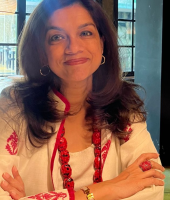Samia Huq
Samia Huq is Dean of the School of General Education and Professor of Anthropology at Brac University, Bangladesh. She obtained her PhD from Brandeis University, USA, looking at women’s religious discussion groups in urban Bangladesh. As Dean of the core curriculum, her task in to build and consolidate the Liberal Arts and Sciences and interdisciplinarity in general education and create curricular and co-curricular pathways for civic engagement and leadership as essential ingredients of the Brac U student experience. Dr. Huq is also Research Fellow at the Center for Peace and Justice (CPJ) at Brac University where she has run the project on Faith and Development in collaboration with the World Faiths Development Dialogue at Georgetown University.
As part of the project, Dr Huq has explored the intersection of faith and development around questions of education, gender equality and aspirations of the youth, facilitating dialogues between faith inspired and secular development actors on these issues. Dr. Huq has been involved in research on the impact of secondary secular and madrasa education on gendered norms and practices, as part of the Initiative on Education, Gender and Growth in Asia http://www.integgra.org/index.php, authored and involved in the International Panel for Social Progress https://www.ipsp.org/ and Musawah https://www.musawah.org/. Dr. Huq is the Chief Academic Officer (CAO) representing Brac University at the Open Society University Network (OSUN) https://opensocietyuniversitynetwork.org/, building bridges between various Brac U academic programs and universities within OSUN and overseeing student and faculty mobility and other exchanges between Brac U and OSUN partners. She also sits on the board of several national NGOs and think tanks. She is author of several peer reviewed journal articles, book chapters and currently working on her monograph on women, Islam and modernity in Bangladesh.
In October 2025 she joins the IAS for a one-month writing residency
Research Interests
Women's activism, gender equality, Islamist pushback, Muslim' women's agency, state laws and policies, civil Islam
Is it possible to carve a cohesive women’s agenda? Between state, movements and (Muslim) women’s perils in Bangladesh
The rapid development and transformation of Bangladesh's economy and society has necessitated a re examination of the nation's cultural practices and social norms, prompting diverse reflections on questions of values. World Faiths Development Dialogue (WFDD), a nonprofit organization housed at the Berkley Center for Religion, Peace, and World Affairs at Georgetown University, and the Center for Peace and Justice (CPJ) at BRAC University have collaborated for a decade on understanding the historical vicissitudes underlying today's social system. This effort has involved multiple actors, secular and religious, who collaborate and compete for hegemony and constituents, with debates often revolving around the differing visions of various groups for social change. The project has focused on education, gender, media and youth, exploring the question of what religion has to do with each of them and their interlinkage. Gender and religion is a particularly vexed topic both in Bangladesh, as well as Globally.
Progress on women’s rights in Bangladesh is threatened by an increasingly vociferous and active backlash, witnessed for example in lowering the age when girls can legally marry to 16. Tensions include debates on the National Development Policy, which witnessed impediments to proposed changes in family law, and increased reports of domestic violence, assault, and rape. Regressive notions of the propriety of women’s roles and comportment are often entangled with religious positions, making “religion” appear as an impediment to social progress towards gender parity and social inclusion. At present there are tensions across the religious-secular divide, and a tentative state whose secular position is often discredited on the basis of Muslim majoritarian impulses. The project seeks to understand pathways of engagement between different stakeholders in order to build consensus around questions of freedom, personal and community resilience by focusing on histories of women’s movements, their interactions with the state on key issues and the growing trends and voices from Islamic women’s perspectives. All parties are invested in their version of freedom which precludes dialogue. As the agenda for women’s freedoms is held hostage at the intersection of the three quarters, the project focuses on ways beyond impasses to form coalitions, highlighting convergences, engaging in dialogue and prioritizing practice over rhetoric.
Key Publications
"Seeking Certainty, Security and Spirituality: Religious Conditioning and Global Aspirations amongst Female University Students in Bangladesh". Contemporary South Asia, 29:2, 257-270. May, 2021.
"Recasting politics and re-imagining Islam: Beyond contested nationalisms in Bangladesh". In Economic and Political Weekly. Vol 56, No.3, 16 Jan 2021
"Defining Self and Other: Bangladesh’s Secular Aspirations and its Writing of Islam" in Economic and Political Weekly (EPW), Vol- XLVIII No.50, December 14, 2013.
|
New session of the "Paris IAS Ideas" online talk series, with the participation of Samia Huq (Brac University, Bangladesh / Paris IAS Fellow). |
|
|
|
|

